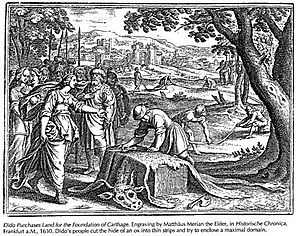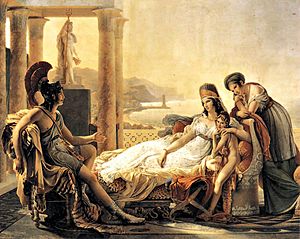Dido, Queen of Carthage facts for kids
Dido was a famous queen from ancient times. Writers from Ancient Greece and Rome say she founded the city of Carthage. Carthage was a powerful city in what is now Tunisia. Dido lived around 3000 years ago, in the 9th century BC. Some parts of her story might be true. Other parts are myths. She is most famous from a poem called the Aeneid by the Roman poet Virgil. Sometimes, she is also called Alyssa or Elissa. People in ancient Carthage even worshipped her as a goddess.
Contents
Early Stories About Queen Dido

The oldest stories about Dido come from an ancient Greek historian named Timaeus. He lived in the 3rd century BC. Later, a Roman historian named Pompeius Trogus also wrote about her. His full story is lost. But another historian, Justin, wrote a summary of Trogus's work.
In these early stories, Dido was the daughter of the King of Tyre. Tyre was a city in what is now Lebanon. She was married to a priest named Acerbas. Dido's brother, Pygmalion, sadly killed Acerbas. Because of this, Dido decided to run away. She took many of her people with her.
They first traveled to Cyprus. Then, they sailed to the northern coast of Africa. This area is now the country of Tunisia.
Founding the City of Carthage
When Dido and her people arrived in Africa, she met a Berber ruler named Iarbus. Dido asked him if she could buy some land. She wanted to start a city for her people. Iarbus said she could have as much land as she could cover with the skin of a dead ox.
Dido was very clever. She told her people to cut the ox skin into very thin strips. They laid all the strips out in a long line. This marked a very large piece of land. Dido and her people then built a city on this land. They named the city Carthage. Dido became its first queen. Carthage grew quickly and became a very rich city. Many Berber people also came to live there.
Dido's Sacrifice
Iarbus saw how rich Carthage had become. He wanted to marry Dido. He told her that if she did not marry him, he would start a war against Carthage. Dido did not want to marry Iarbus. She still loved her first husband, Acerbas.
Before the wedding, Dido built a large fire. She told Iarbus it was a special ceremony to honor Acerbas. She said that after the ceremony, she would be his wife. Instead, Dido climbed onto the burning pyre. She then killed herself with a sword. After she died, the people of Carthage worshipped her as a goddess. Carthage remained a rich and powerful city for 600 years. It was destroyed by Rome in 146 BC.
Aeneas and Queen Dido
Most people today know Dido from the story in Virgil's Aeneid. This famous poem tells a different version of her death. Virgil's story about Dido's early life is much like the older tales. But how she dies is very different.
In Virgil's story, Aeneas is a prince from the ancient city of Troy. He comes to Carthage after his city loses the Trojan War to the Greeks. Aeneas and Dido fall in love. Aeneas decides to stay in Carthage with Dido.
However, the god Jupiter sends his messenger, Mercury. Mercury tells Aeneas that he must leave Carthage. He must travel to Italy to fulfill his destiny. Aeneas does not want to go. But he knows he must obey Jupiter. So, he and his men sail away from Carthage.
Dido is heartbroken and very angry. She builds a large fire. She plans to burn all the things that belonged to Aeneas. Then, she climbs to the top of the fire. She kills herself with the sword that she had given Aeneas when he first arrived.
Stories Inspired by Aeneas and Dido
Many people believe Virgil was the first to create the story of Aeneas and Dido. Others think he got the idea from an older poem. This poem was called Bellum Poenicum (The Punic Wars) by Gnaeus Naevius. Most of Naevius's poem is now lost. So, it is hard to know for sure.
Since Virgil's time, many plays and operas have been made about Aeneas and Dido. Christopher Marlowe wrote a play about them in 1583. It was called Dido Queen of Carthage. Henry Purcell also created an opera about them in 1688. It was named Dido and Aeneas.
The Italian poet Pietro Metastasio also used Virgil's story. He wrote a libretto for an opera called Didone abbandonata. This title means Dido Abandoned in Italian. The first opera to use Metastasio's libretto was by Domenico Sarro in 1724. Over the next 100 years, more than 40 other composers used this same libretto for their operas.
 | Precious Adams |
 | Lauren Anderson |
 | Janet Collins |


